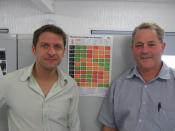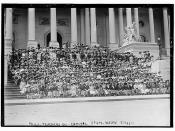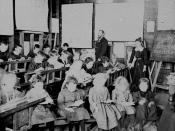Reading and writing are similar processes, as both involve the making of meaning by actively engaging a text. A reader is an active constructor of meaning just like the writer. Thus, teachers find it is particularly important to ask questions of their students after reading a text, and to answer their own concern: What have the students understood through reading? Teachers also like to engage their students in creative drama, both enacted and as a writing assignment. Creative drama is meant to engage all of the faculties involved in the writing and reading processes.
In Grades K-2, students are regularly presented by teachers with passages that have words left out. This exercise follows passage reading, of course. Writing is assessed at this stage by having the students write stories. Teachers would assess each student's ability to compose appropriate language, follow the writing conventions (spelling, punctuation, etc.) and address the writing task.
In Grades 3-5, teachers can have their students write stories with multiple elements, and assessment will be based on the inclusion of those elements, language usage, organization and mechanics.
Besides planning on assessment tools for reading and writing in the classroom, teachers must also pour thought over the development of a literature focus unit. The focus or theme of a literature unit must be relevant to the developmental stage of the group of students it is meant for. This focus would lead to generalizations in the comprehension of itself. Before selecting books for the unit, it is a significant practice to brainstorm for generalizations. Teachers must also identify literary targets related to the literature focus, that is, What are the skills and strategies the teacher would like to impart through this unit? Assessment procedures and learning activities including research projects must then be organized.
It is imperative that teachers...


